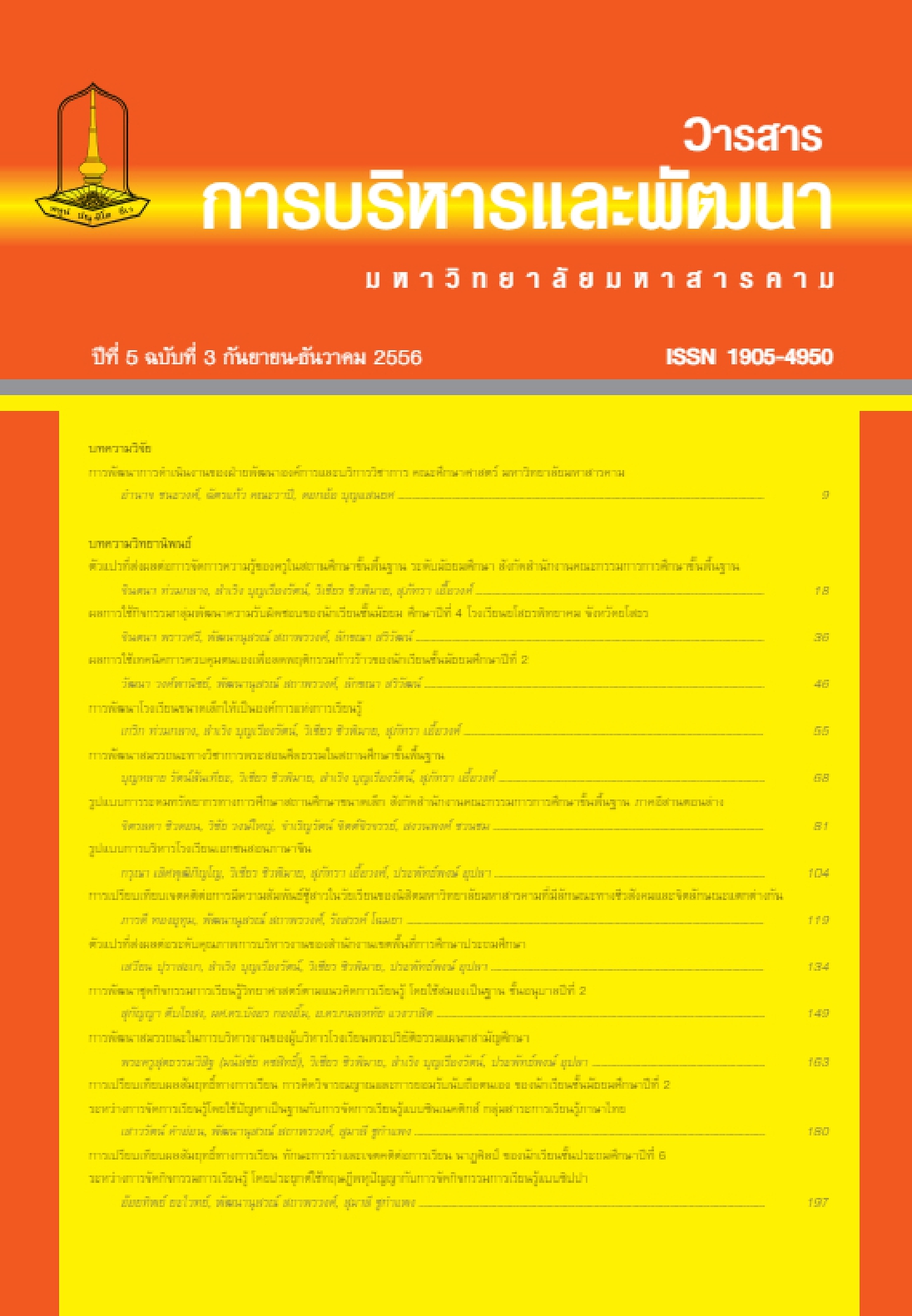ตัวแปรที่ส่งผลต่อการจัดการความรู้ของครูในสถานศึกษาขั้นพื้นฐานระดับมัธยมศึกษา สังกัดสำนักงานคณะกรรมการการศึกษาขั้นพื้นฐาน
Main Article Content
บทคัดย่อ
การวิจัยครั้งนี้มีวัตถุประสงค์ เพื่อศึกษาตัวแปรที่ส่งผลต่อการจัดการความรู้ของครูในสถานศึกษาขั้นพื้นฐาน ระดับมัธยมศึกษา สังกัดสำนักงานคณะกรรมการการศึกษาขั้นพื้นฐาน กลุ่มตัวอย่าง คือโรงเรียนมัธยมศึกษา สังกัดสำนักงานคณะกรรมการการศึกษาขั้นพื้นฐาน กระทรวงศึกษาธิการ ปีการศึกษา 2554 จำ นวน 60 โรงเรียนในจังหวัดชัยภูมิ จังหวัดนครราชสีมา จังหวัดบุรีรัมย์ จังหวัดสุรินทร์ และจังหวัดขอนแก่น ซึ่งเลือกโดยให้ความน่าจะเป็นของการได้รับเลือกโรงเรียนเป็นปฏิภาคโดยตรงกับจำนวนครูในแต่ละโรงเรียนเครื่องมือที่ใช้ในการวิจัยประกอบด้วย แบบสอบถามจำนวน 6 ฉบับได้แก่ แบบสอบถามระดับการจัดการความรู้ของโรงเรียน จำนวน 80 ข้อ แบบสอบถามระดับความเป็นผู้นำทางวิชาการของผู้อำนวยการโรงเรียน จำนวน 6 ข้อ แบบวัดแรงจูงใจใฝ่รู้ของผู้อำนวยการโรงเรียนและครูผู้สอน จำนวน 20 ข้อ แบบวัดเจตคติของผู้อำนวยการโรงเรียนและครูผู้สอนที่มีต่อการจัดการความรู้ของโรงเรียน จำนวน 20 ข้อ แบบสอบความร่วมมือในการปฏิบัติงานของผู้อำนวยการและบุคลากรในโรงเรียน จำนวน 20 ข้อ และ แบบสอบถามวัฒนธรรมองค์กรของโรงเรียนจำนวน 16 ข้อ ผู้ให้ข้อมูลคือผู้อำ นวยการโรงเรียนและครูผู้สอนโรงเรียนละ5 คนรวมทั้งสิ้น 360 คน สถิติที่ใช้ในการวิเคราะห์ข้อมูลได้แก่ ค่าเฉลี่ย ค่าเบี่ยงเบนมาตรฐาน ค่าสัมประสิทธิ์ของความแปรผัน ค่าน้ำหนักความสำคัญของตัวแปรต้นที่ส่งผลต่อตัวแปรตาม ค่าสหสัมพันธ์พหุคูณ และค่าสหสัมพันธ์พหุคูณยกกำลังสอง
ผลการวิจัยพบว่า1. โรงเรียนมีการจัดการความรู้อยู่ในระดับมาก แต่ละโรงเรียนมีระดับการจัดการความรู้แตกต่างกันน้อย
2. เมื่อวิเคราะห์ค่าน้ำหนักความสำคัญ (β) พบว่าระดับเจตคติของผู้อำนวยการโรงเรียนที่มีต่อการจัดการความรู้ (ATL) ส่งผลทางบวกต่อระดับการจัดการความรู้ (β = 0.322) อย่างมีนัยสำคัญทางสถิติที่ระดับ α = .05 และวัฒนธรรมองค์กรของโรงเรียนแบบราชการ (BC) ส่งผลทางลบต่อระดับการจัดการความรู้ (β= - 0.295) อย่างมีนัยสำคัญทางสถิติที่ระดับ α = .05 สามารถ อธิบายความแปรปรวนของระดับการจัดการความรู้ได้ ร้อยละ 35 (R = 0.591 ; R2 = 0.350) ซึ่งมีนัยสำคัญทางสถิติที่ระดับ α = .05
Downloads
Article Details
เอกสารอ้างอิง
Anyanee Klaisuban. (2007). Fundamental Knowledge Management. Bangkok: tchkasem Printing Group.
Bodin Wichan. (2004). From Knowledge Management to Practical Wisdom. 2nd Edition. Bangkok: Thankamol.
Boonsong Hanpanich. (2003). The Development of Knowledge Management Models in Thai Higher Education Institutions. Thesis, Doctor of Philosophy in Education. Bangkok: Graduate School, Chulalongkorn University.
Burachai Siramahasakorn. (2007). Excellence through Knowledge Management. Bangkok: Saengdao.
Cooperman, Dan R. (1997, September). “Collaborative Management, Teacher Characteristics, and Instructional Practice: HLM Analysis of The Prospects Data Survey.” Dissertation Abstracts International. 58 (03): 661-A.
Davenport, T. H. (1997). Information Ecology. New York: Oxford University.
Department of Provincial Administration. (2007). Manual for Operation in southern bordering provinces. Bangkok: Internal Security Affairs Bureau, Coordination centre for the administration of the southern bordering provinces.
Enriquez, J. (2001). As the Future Catches You. New York: Tuttle-Mori.
Hersey, Paul and Blanchard, Kenneth H. (1993). Management of Organizational Behavior:Utilizing Human Resources. Englewood Cliffs, N.J.A. Simon and Schmaste Company.
Hoy, Wayne K. and Miskel, Cecil G. (2001). Educational Administration: Theory,
Research Practice. 6th ed. Singapore: McGraw-Hill.
Kosol Deeseentham. (2003) Knowledge Management in the New Economy. Bangkok: Tana Press & Graphic.
Marquardt, Michael J. (1996).Building the Learning Organization.New York: McGraw–Hill.
Namtip Wipawin. (2004). Knowledge Management and Knowledge Assets. Bangkok: SR Printing Mass Products.
Office of the National Economic and Social Development Board. (2008). The Tenth National Economic and Social Development Plan. Bangkok:Kansassana Publishing.
Office of the Public Sector Development Commission and Thailand Productivity Institute. (2005). Knowledge Management Action Plan Development Manual. Bangkok: Thailand Productivity Institute.
Phichet Banyat. (2006). “Organizational Knowledge Management.” Chiang Mai University Library Journal. 13 (1): 1-16.
Pornthida Wichianpanya. (2004). Basic Knowledge Management and the Application. Bangkok: Thankamol Publishing.
Prapon Phasukyud. (2007). Knowledge Management for Newbies. 11th Edition. Bangkok: Yaimai.
Prasit Sarasant. (1999). Managerial Behavior Related to Primary School Administrators’ Managerial Achievement. Dissertation, Doctor of
Philosophy in Education. Bangkok: Graduate School, Srinakharinwirot University, Prasarnmit Campus.
Samrerng Boonruangrutana, Suwat Wiwatthananon and Nikom Nak-ay. (2007). “The Search for Practical Models of Students’ Educational Results with the Least Variables.” Vongchavalitkul University Academic Journal. 1: 7-13.
Singh, K., Granvill, M. and Dicka. S. (2002). “Mathematics and Science Achievement: Effects of Motivation, Interest and Academic Engagement.”The Journal of Education Research. 95 (6): 323-332.
Sirikarn Kraibamrung. (2010). Variables Affecting Levels of School-Based Management Performance of Basic Education Institutions. Thesis, Doctor of Philosophy in Education. Nakhon Ratchasima: Faculty of Education, Vongchavalitkul University.
Smith, E.W. (1997). The Education Encyclopedia. New Jersey: Prentice Hall.
Somsak Chansungnoen. (2009). Variables Affecting Levels of Learning Organization in Schools. Thesis, Doctor of Philosophy in Education. Nakhon Ratchasima: Faculty of Education, Vongchavalitkul University.
Suwat Wiwatthananon. (2005). The Multi-Level Factors Affecting the Effectiveness of the Government Secondary Schools in the Bangkok Metropolis. Thesis, Doctor of Philosophy in Education. Nakhon Ratchasima: Graduate School, Vongchavalitkul University.
Tannonbaum, S.I.,and Alliger, G.M. (2000). Knowledge Management: Clarifying the Key Issue. U.S.A.: the Inernational Association for Human Resource Information Management.
Teera Runcharoen. (2007). Professionalism in Educational Administration in the Age of Educational Revolution. Bangkok: Khao Fang.
Vicharn Panich. (2008). Practical Knowledge Management. 4th Edition. Bangkok: Sukkhapabjai.
Vicharn Panich. (2004, May-June). “Knowledge Triangle.” Academic Journal of Education. 1 (1): 9-12.
Wasan Lajantuk. (2005). Knowledge Management at Basic Education Schools under the Office of Khon Kaen Educational Service Area 4. Thesis, Master of Education. KhonKaen: Graduate School, Khon Kaen University.
Wilawan Makhum. (2006). The Development of Indicators for Knowledge Management of Teachers in Basic Education Institutions under the Ministry of Education. Thesis, Doctor of Philosophy in Education. Bangkok: Graduate School, Srinakharinwirot University, Prasarnmit Campus.


